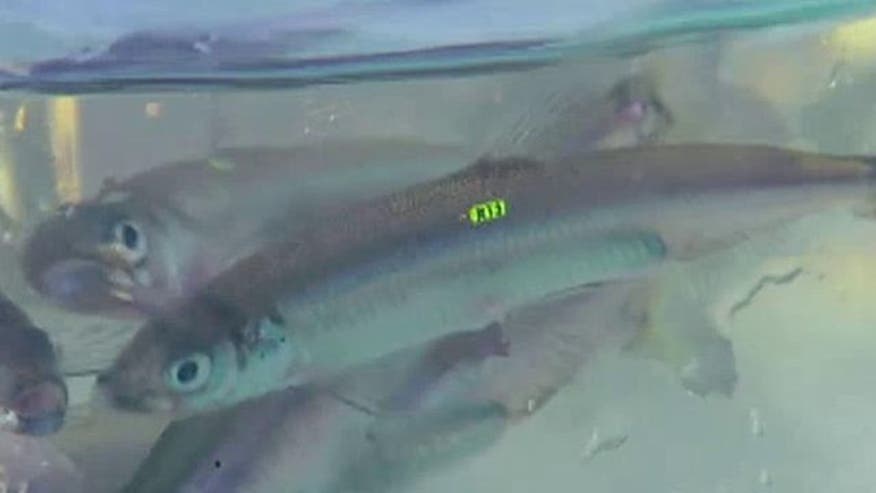
At three inches long, the delta smelt is one of the smallest fish in California — but ounce for ounce, no species statewide carries more weight.
Endangered since 1993, the plankton-eating silver minnow is blamed by farmers, lawmakers and water officials up and down the Golden State for locking down billions of gallons of water that otherwise would go to them. That’s because, since the smelt’s listing as a protected species, biologists have tried saving the fish, in part, by withholding fresh river runoff annually to maintain smelt-friendly temperature and salinity levels.
Farmers and downstate cities — already suffering the effects of the drought — claim that water was allocated to them, and withholding it for a fish with no commercial purpose is bad policy.
“California fruits and vegetables are sent all over the world,” said Republican state Assemblyman Travis Allen. “When we are diverting our water to save a few pinky-size fish and leaving hundreds of thousands of acres fallow – there is something wrong with our priorities.”
But major farm organizations are exploring a new option in the increasingly contentious fight, as the fish population continues to plummet despite conservation efforts: Declare the species extinct, and delist it as an endangered species, thus allowing regulators to turn on the pumps that appear lethal to the tiny minnows.
The numbers suggest the delta smelt, indeed, could be wiped out soon anyway.
In a March 2012 trawl survey, wildlife officials found 296 fish. An identical sampling a month later found 143. But in April 2015, officials found a single fish, not enough to propagate the species.
Dr. Peter Moyle, an expert at UC Davis, predicts the smelt will likely be gone for good in about two years.
But those considering a push to delist could be in for a fight.
Moyle and other fish biologists say the U.S. has a moral obligation to save the species, and making it the poster child for California’s drought is unfair. “Trying to blame fish for a shortage of water just isn’t right and isn’t true,” Moyle said. “The delta smelt is in decline because the delta is in decline.”
The Sacramento-San Joaquin Delta is the largest estuary of its kind between Alaska and Argentina – a giant intersection of snowmelt and ocean that supplies water to 25 million Californians. Once the most plentiful fish in the delta, the smelt has been in decline for decades, the victim of predators, urbanization and changing conditions.
“It is a very delicate fish,” Moyle said. “But it’s just the first fish on the chopping block if we don’t manage the delta properly.”
But Allen said that when pitting the “bait fish” against California families, “I think that is a pretty easy decision to make.”
Figuring out a way forward won’t be easy. The delta is the most contentious body of water in California, pulled in all directions by powerful interests. But the smelt, steelhead and salmon have a trump card in their pocket – the Endangered Species Act, which says the federal government must do everything it can to stop the species from going extinct. That’s why some are considering a push to delist the fish.
The mandate, meanwhile, underpins the UC Davis Fish Conservation and Cultural Laboratory, a ramshackle outpost of trailers on the southern shore of the delta outside Sacramento. There, biologists successfully raise the smelt in dozens of temperature-controlled tanks. Beginning with 160 fish in 2006, the labs produce 250 pairs a year using artificial insemination, squeezing eggs from each female into a bowl, then fertilizing them with male sperm. Two months later, the tiny larvae emerge from beakers full of eggs.
Problem is the fish, which live no longer than a year, have nowhere to go. Unable to survive in the delta, most are handed over to researchers trying to figure out how to save the species.
“Is farming more important than fisheries? Is fisheries more important than farming? Personally, I think fisheries has gotten the short end of stick for years,” Moyle said.
Environmental groups claim more than just smelt depend on a healthy delta and adequate downstream flows, from salmon to sturgeon.
“We have 80 fish species in California, like the delta smelt, that are in trouble,” Moyle said. “There are other species deserving of protection.”
In the meantime, farmers, cities and conservationists will fight over water they claim is rightfully theirs as California heads into a fourth summer of severe drought.
William La Jeunesse joined FOX News Channel (FNC) in March 1998 and currently serves as a Los Angeles-based correspondent.

